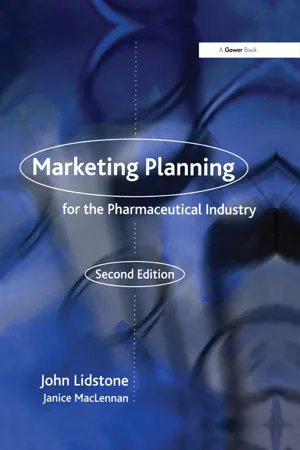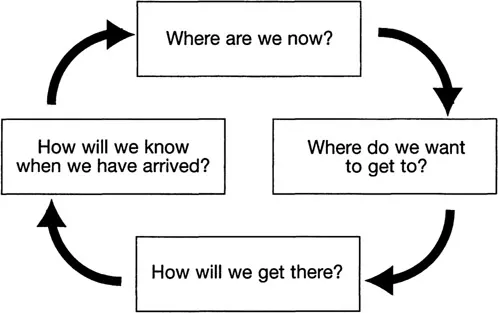
Marketing Planning for the Pharmaceutical Industry
John Lidstone, Janice MacLennan
- 168 pages
- English
- ePUB (mobile friendly)
- Available on iOS & Android
Marketing Planning for the Pharmaceutical Industry
John Lidstone, Janice MacLennan
About This Book
Marketing in the pharmaceutical and healthcare sector requires a particular set of skills; its intricacies mean planning is an essential prerequisite. The marketing planning system described in this book has been designed to enable marketing and product executives to produce a plan which serves as a dynamic management tool which will help them to get from where they are now to where they want to be next year and thereafter. Now in its second edition, this bestselling book has become the standard text for all product managers, marketing managers and directors working in this demanding industry. John Lidstone and Janice MacLennan have updated the book to embrace best current practice. A new orientation to external analysis and a reworking of the application of SWOT analysis, along with fresh material on sales forecasting and strategy implementation, bring the book up to date with current thinking and industry trends. Marketing Planning for the Pharmaceutical Industry is based on real life experience built up over many years. Each chapter takes the reader through the sequential stages of planning so that by the end they will be able to produce a practical plan ready for implementation. It is the only book of this type which tailors marketing to those working in the sector and as such is a unique, invaluable and indispensable resource.
Frequently asked questions
Information
1
Introduction
What is meant by the term ‘marketing plan’?
Why marketing planning?
How do marketing plans accommodate the future?
- ● customers;
- ● products;
- ● prices;
- ● costs;
- ● production;
- ● technology;
- ● distribution;
- ● competition;
- ● regulations.
The benefits of planning
- ● help to identify and develop the new skills and procedures that will be required in the future: the skills and procedures that managers have developed to deal with today’s decisions are rarely adequate for making decisions about tomorrow;
- ● prepare the company for change so that it can take a commanding lead over those companies that merely react: as businesses inevitably change, so marketing planning helps the transition from today to tomorrow to be smooth and predictable. Planning for changed circumstances provides the single opportunity to gain significant advantages over the competition. Regulatory requirements, product innovation, new technology, standardized distribution and other realities all combine to even out companies. Yet, the same factors which account for market changes also provide great opportunities;
- ● provide a vehicle for communicating the changes and their effects in an open and non-threatening manner, a common belief is that people resist change; this is a mistake. Research has shown that people resist change only when they are uncertain of the personal effect. When change is shown to be beneficial, it tends to be supported;
- ● evaluate and reduce the available options to achieve the best chance of success and the least chance of error, there is little choice when allocating today’s resources and, thus, little room for error. However, when looking forward, the choice is large. R & D can be directed anywhere, plant and production lines can manufacture anything, finance can be raised for any purpose. With such a large range of choice the chances of making errors increase. The alternative is to wait until circumstances change and force a decision. The probability then is that the decision taken will not be the best one;
- ● provide a method for handling complexity: more often than not a pharmaceutical company serves several markets. There are several groups of people who use or buy each product. This produces a complex situation. Each group of people is subject to change, both in varying directions and at different rates. Thus, if a company has only six products each with three user/buyer groups, then it is dealing with 18 different, changing markets. One way of dealing with this is ‘muddling through’, or reacting when forced to, ignoring the complexity and taking the least possible action. It is through evaluating each market, establishing the nature of the changes and deciding on a profit potential, that resources can be allocated. Thus, the strategy can be the same, but the local market objectives and how that strategy should be implemented will probably always be different;
- ● identify the role of each department and offers the means to co-ordinate their activities: as with changing markets, businesses can become complex. A company with national and international markets may have many departments to cater for some activity that meets the needs of these markets. If all these departments are not coordinated and heading in the same direction, chaos will follow;
- ● ensure that the company is proactive in its approach to acquiring the capabilities it needs: as a company develops, so each of the departments evolves; this leads to increased demands upon the resources of time and money. If reactive decisions are made, the resulting demands for plant, equipment, R & D, people, finance, even products, exceed the company’s ability to supply. As a result, growth becomes disorderly and wasteful, competitive advantage is forfeited, and profits delayed or lost.
The marketing planning concept
An Overview

Where are we Now?
- ● understand who the customers are or could be;
- ● understand the needs of its customers;
- ● understand the dynamics of the competi...